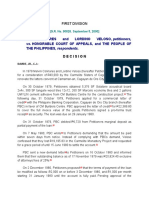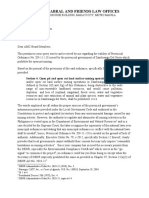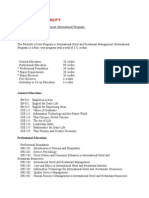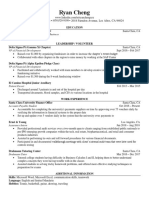0 ratings0% found this document useful (0 votes)
28 viewsBALDOMERO INCIONG, JR., Petitioner, Court of Appeals and Philippine Bank OF COMMUNICATIONS, Respondents
BALDOMERO INCIONG, JR., Petitioner, Court of Appeals and Philippine Bank OF COMMUNICATIONS, Respondents
Uploaded by
ARNOLD CABRAL1) Petitioner signed a promissory note for P50,000 along with two others as co-makers to obtain a loan but claimed he was fraudulently induced to sign thinking it was only for P5,000. [2] The lower court and Court of Appeals ruled against the petitioner. [3] The Supreme Court denied the petition, finding the fraud claim was not sufficiently proven and that as a co-maker, petitioner was jointly and severally liable for the full amount of the loan.
Copyright:
© All Rights Reserved
Available Formats
Download as PPTX, PDF, TXT or read online from Scribd
BALDOMERO INCIONG, JR., Petitioner, Court of Appeals and Philippine Bank OF COMMUNICATIONS, Respondents
BALDOMERO INCIONG, JR., Petitioner, Court of Appeals and Philippine Bank OF COMMUNICATIONS, Respondents
Uploaded by
ARNOLD CABRAL0 ratings0% found this document useful (0 votes)
28 views9 pages1) Petitioner signed a promissory note for P50,000 along with two others as co-makers to obtain a loan but claimed he was fraudulently induced to sign thinking it was only for P5,000. [2] The lower court and Court of Appeals ruled against the petitioner. [3] The Supreme Court denied the petition, finding the fraud claim was not sufficiently proven and that as a co-maker, petitioner was jointly and severally liable for the full amount of the loan.
Original Title
Inciong vs CA
Copyright
© © All Rights Reserved
Available Formats
PPTX, PDF, TXT or read online from Scribd
Share this document
Did you find this document useful?
Is this content inappropriate?
1) Petitioner signed a promissory note for P50,000 along with two others as co-makers to obtain a loan but claimed he was fraudulently induced to sign thinking it was only for P5,000. [2] The lower court and Court of Appeals ruled against the petitioner. [3] The Supreme Court denied the petition, finding the fraud claim was not sufficiently proven and that as a co-maker, petitioner was jointly and severally liable for the full amount of the loan.
Copyright:
© All Rights Reserved
Available Formats
Download as PPTX, PDF, TXT or read online from Scribd
Download as pptx, pdf, or txt
0 ratings0% found this document useful (0 votes)
28 views9 pagesBALDOMERO INCIONG, JR., Petitioner, Court of Appeals and Philippine Bank OF COMMUNICATIONS, Respondents
BALDOMERO INCIONG, JR., Petitioner, Court of Appeals and Philippine Bank OF COMMUNICATIONS, Respondents
Uploaded by
ARNOLD CABRAL1) Petitioner signed a promissory note for P50,000 along with two others as co-makers to obtain a loan but claimed he was fraudulently induced to sign thinking it was only for P5,000. [2] The lower court and Court of Appeals ruled against the petitioner. [3] The Supreme Court denied the petition, finding the fraud claim was not sufficiently proven and that as a co-maker, petitioner was jointly and severally liable for the full amount of the loan.
Copyright:
© All Rights Reserved
Available Formats
Download as PPTX, PDF, TXT or read online from Scribd
Download as pptx, pdf, or txt
You are on page 1of 9
BALDOMERO INCIONG, JR.
, petitioner,
vs.
COURT OF APPEALS and PHILIPPINE BANK
OF COMMUNICATIONS, respondents.
G.R. No. 96405 June 26, 1996
Facts
• Petitioner's liability resulted from the promissory note in the
amount of P50,000.00 which he signed with Rene C. Naybe
and Gregorio D. Pantanosas on February 3, 1983, holding
themselves jointly and severally liable to private respondent
which was already due.
• Said due date expired without the promissors having paid their
obligation despite several demands made by the private
respondent.
• Private Respondent filed action for fulfilment of the obligation.
Brief Background of the case: Petitioner
• Petitioner alleged that sometime in January 1983, he was approached
by his friend, Rudy Campos, who told him that he was a partner of Pio
Tio, the branch manager of private respondent in Cagayan de Oro
City, in the falcata logs operation business. Campos also intimated to
him that Rene C. Naybe was interested in the business and would
contribute a chainsaw to the venture. He added that, although Naybe
had no money to buy the equipment, Pio Tio had assured Naybe of
the approval of a loan he would make with private respondent.
Campos then persuaded petitioner to act as a "co-maker" in the said
loan. Petitioner allegedly acceded but with the understanding that he
would only be a co-maker for the loan of P50,000.00.
Ruling of the Lower Court
• The lower court dismissed the case against defendant
Pantanosas as prayed for by the private respondent herein.
Meanwhile, only the summons addressed to petitioner was
served as the sheriff learned that defendant Naybe had gone to
Saudi Arabia.
• Petitioner alleged that he acceded as “co-maker” with the
understanding that the amount is only P5,000.00 and it was his
and Naybe’s agreement, thus, not binding to the private
respondent.
• Lower Court held in favor of the respondent.
Ruling of the Court of Appeals
• On February 6, 1991, the Court denied the petition for failure of
petitioner to comply with the Rules of Court and paragraph 2 of
Circular No. 1-88, and to sufficiently show that respondent court
had committed any reversible error in its questioned
decision. His motion for the reconsideration of the denial of his
petition was likewise denied with finality in the Resolution of
April 24, 1991. Thereafter, petitioner filed a motion for leave to
file a second motion for reconsideration which, in the Resolution
of May 27, 1991, the Court denied. In the same Resolution, the
Court ordered the entry of judgment in this case.
Supreme Court Ruling
• Judge Pantanosa (co-maker) made an affidavit and it supports
petitioner's allegation that they were induced to sign the
promissory note on the belief that it was only for P5,000.00,
adding that it was Campos who caused the amount of the loan
to be increased to P50,000.00. But the said affidavit was not
presented during trial in the lower court.
• Petitioner contends that in signing the promissory note, his
consent was vitiated by fraud as, contrary to their agreement
that the loan was only for the amount of P5,000.00, the
promissory note stated the amount of P50,000.00.
Supreme Court Ruling
• SC stated that, fraud must be established by clear and
convincing evidence, mere preponderance of evidence, not
even being adequate. Petitioner's attempt to prove fraud must,
therefore, fail as it was evidenced only by his own
uncorroborated and, expectedly, self-serving testimony.
• SC confirmed also that petitioner signs as a “co-maker” (Jointly
and Severally liable) not a guarantor as the latter alleged
invoking Article 2080 of the Civil Code.
Solidary or Joint and Several Obligation
• A solidary or joint and several obligation is one in which each
debtor is liable for the entire obligation, and each creditor is
entitled to demand the whole obligation
• Section 4, Chapter 3, Title I, Book IV of the Civil Code states the
law on joint and several obligations. Under Art. 1207 thereof,
when there are two or more debtors in one and the same
obligation, the presumption is that the obligation is joint so that
each of the debtors is liable only for a proportionate part of the
debt. There is a solidary liability only when the obligation
expressly so states, when the law so provides or when the nature
of the obligation so requires.
Supreme Court Ruling
• Dismissal of the case against Judge Pontanosas may not be
deemed as having discharged petitioner from liability as well.
• As to Naybe, Court never acquired jurisdiction over his case.
• Petitioner, therefore, may only have recourse against his co-
makers, as provided by law.
• Petition for Review on Certiorari is hereby DENIED
You might also like
- DDM Federal BankDocument15 pagesDDM Federal BankShubhangi 16BEI0028No ratings yet
- 21 Pineda v. de VegaDocument4 pages21 Pineda v. de VegaMarga Villanueva100% (1)
- 12d Installing Practise VersionDocument18 pages12d Installing Practise VersionKsatrio Pinayung RizqiNo ratings yet
- CAT Haul Road DesignDocument103 pagesCAT Haul Road DesignKevin Mccarthy100% (5)
- Baldomero Inciong, JR., Petitioner, vs. Court of Appeals and Philippine Bank of Communications, RespondentsDocument6 pagesBaldomero Inciong, JR., Petitioner, vs. Court of Appeals and Philippine Bank of Communications, RespondentsgeorjalynjoyNo ratings yet
- 4 Inciong vs. Court of AppealsDocument7 pages4 Inciong vs. Court of Appealsmartin vincentNo ratings yet
- Inciong Vs CA G.R. No. 96405 June 26, 1996Document3 pagesInciong Vs CA G.R. No. 96405 June 26, 1996Emil Bautista100% (1)
- Joint and SolidaryDocument11 pagesJoint and Solidaryobladi obladaNo ratings yet
- Full Text Compiliation EvidenceDocument95 pagesFull Text Compiliation EvidenceBec Bec BecNo ratings yet
- 10 Inciong Vs CADocument10 pages10 Inciong Vs CAEMNo ratings yet
- Petitioner Vs Vs Respondents Emilio G. Abrogena Teogenes X. VelezDocument6 pagesPetitioner Vs Vs Respondents Emilio G. Abrogena Teogenes X. VelezJade ClementeNo ratings yet
- CasesDocument24 pagesCasesTrisha AmorantoNo ratings yet
- Inciong Vs Ca Full TextDocument4 pagesInciong Vs Ca Full TextThea Jane MerinNo ratings yet
- CasesDocument24 pagesCasesTrisha AmorantoNo ratings yet
- Inciong v. CA - 257 SCRA 578Document3 pagesInciong v. CA - 257 SCRA 578alilramonesNo ratings yet
- Inciong v. CA Case DigestDocument3 pagesInciong v. CA Case DigestArvy AgustinNo ratings yet
- Inciong V CA GR No. 96405 June 26, 1996Document6 pagesInciong V CA GR No. 96405 June 26, 1996Francisco III MoraldeNo ratings yet
- Supreme CourtDocument46 pagesSupreme CourtTrisha AmorantoNo ratings yet
- Development Bank of The Philippines VDocument6 pagesDevelopment Bank of The Philippines VCamille BritanicoNo ratings yet
- Bonnevie vs. CADocument4 pagesBonnevie vs. CAvanessa_3No ratings yet
- Victoria Moreo-Lentfer, Gunter Lentfer and John Craigie Young Cross, Petitioners, vs. Hans JURGEN WOLFF, RespondentDocument6 pagesVictoria Moreo-Lentfer, Gunter Lentfer and John Craigie Young Cross, Petitioners, vs. Hans JURGEN WOLFF, RespondentLee SomarNo ratings yet
- Llamado Vs CADocument18 pagesLlamado Vs CANeil ZubiagaNo ratings yet
- Inciong v. CA, 257 SCRA 578 (1996)Document2 pagesInciong v. CA, 257 SCRA 578 (1996)edgepusoNo ratings yet
- Natino vs. IACDocument6 pagesNatino vs. IACAnonymous 33LIOv6L100% (1)
- PCIB Vs AlejandroDocument1 pagePCIB Vs AlejandroJudy Miraflores DumdumaNo ratings yet
- Civil Procedure Digest 3Document10 pagesCivil Procedure Digest 3Neidine Angela FloresNo ratings yet
- Yeboa and Another Vs Bofour PDFDocument22 pagesYeboa and Another Vs Bofour PDFGideon OkaiNo ratings yet
- Spouses Ramos V ObispoDocument7 pagesSpouses Ramos V ObispoTiff AtendidoNo ratings yet
- Inchausti V YuloDocument17 pagesInchausti V YuloAlvin Lorenzo V. Ogena100% (1)
- GR 159048 Go Vs BacaronDocument7 pagesGR 159048 Go Vs Bacaronlucci_1182100% (1)
- Credit Transactions Case Digest: Bonnevie v. CA (1983) : G.R. No. L-49101Document10 pagesCredit Transactions Case Digest: Bonnevie v. CA (1983) : G.R. No. L-49101Mp CasNo ratings yet
- Moreno-Lentfer Vs Hans Jurgen WolffDocument9 pagesMoreno-Lentfer Vs Hans Jurgen WolffCarlo ImperialNo ratings yet
- G.R. No. 167805 November 14, 2008 ARNOLD STA. CATALINA, Petitioner, People of The Philippines, Respondent. Decision QUISUMBING, Acting C.J.Document47 pagesG.R. No. 167805 November 14, 2008 ARNOLD STA. CATALINA, Petitioner, People of The Philippines, Respondent. Decision QUISUMBING, Acting C.J.Anisah AquilaNo ratings yet
- Pre-Trial Brief - MonterealDocument5 pagesPre-Trial Brief - MonterealKING ANTHONY MONTEREALNo ratings yet
- Vs. Honorable Court of Appeals, and The People ofDocument10 pagesVs. Honorable Court of Appeals, and The People ofGada AbdulcaderNo ratings yet
- Sps Ramos V Obispo G.R. 193804Document8 pagesSps Ramos V Obispo G.R. 193804Dino Bernard LapitanNo ratings yet
- Oblicon Digests 2Document26 pagesOblicon Digests 2Real TaberneroNo ratings yet
- NIL CasesDocument51 pagesNIL CasesLope Nam-iNo ratings yet
- G.R. No. 157943 September 4, 2013 People of The Philippines, Plaintiff-Appellee, vs. Gilbert Reyes Wagas, Accused-AppellantDocument4 pagesG.R. No. 157943 September 4, 2013 People of The Philippines, Plaintiff-Appellee, vs. Gilbert Reyes Wagas, Accused-AppellantAubrey CaballeroNo ratings yet
- OBLICON Case DigestsDocument56 pagesOBLICON Case Digestsglaize587No ratings yet
- Digest ObliconDocument10 pagesDigest ObliconFredal OrmeñoNo ratings yet
- Inciong CaseDocument2 pagesInciong CasequeshemNo ratings yet
- PCIB Vs ALEJANDRODocument4 pagesPCIB Vs ALEJANDROJocelyn Dalmacio100% (1)
- Case Study 03Document2 pagesCase Study 03Hychell Mae Ramos DerepasNo ratings yet
- 06 Inciong v. CADocument11 pages06 Inciong v. CADarren MansillaNo ratings yet
- RFLIB Case DigestDocument6 pagesRFLIB Case DigestNor Alem SampornaNo ratings yet
- En Banc A.C. No. 6470, July 08, 2014 MERCEDITA DE JESUS, Complainant, v. ATTY. JUVY MELL SANCHEZ-MALIT, Respondent. Resolution Sereno, C.J.Document4 pagesEn Banc A.C. No. 6470, July 08, 2014 MERCEDITA DE JESUS, Complainant, v. ATTY. JUVY MELL SANCHEZ-MALIT, Respondent. Resolution Sereno, C.J.Vilpa VillabasNo ratings yet
- Judgment Harriet Mushega & Others V Kashaya WilsonDocument6 pagesJudgment Harriet Mushega & Others V Kashaya Wilsonsamurai.stewart.hamiltonNo ratings yet
- Gajudo V Traders Royal Bank DigestDocument4 pagesGajudo V Traders Royal Bank DigestRay SantosNo ratings yet
- Sulla, Cloie Anne C - Case Digests For FinalsDocument19 pagesSulla, Cloie Anne C - Case Digests For FinalsCloieRjNo ratings yet
- Bonnevie Vs CADocument4 pagesBonnevie Vs CAPam ChuaNo ratings yet
- BENJAMIN LEE vs. COURT OF APPEALS and PEOPLE OF THE PHILIPPINES, G.R. NO. 145498Document5 pagesBENJAMIN LEE vs. COURT OF APPEALS and PEOPLE OF THE PHILIPPINES, G.R. NO. 145498hudor tunnelNo ratings yet
- Task Performance Business LawDocument36 pagesTask Performance Business Lawsophiacagadas10No ratings yet
- Inciong Vs CADocument1 pageInciong Vs CAJonnifer QuirosNo ratings yet
- D & C Builders LTD V Rees (P)Document11 pagesD & C Builders LTD V Rees (P)harshitaNo ratings yet
- DIGEST Sps. Ramos v. ObispoDocument3 pagesDIGEST Sps. Ramos v. ObispoCarlos Poblador100% (2)
- CivRev - Solidarios V AlampayDocument5 pagesCivRev - Solidarios V AlampayKarla Marie TumulakNo ratings yet
- Nego Case Digests Sections 14 - 20Document12 pagesNego Case Digests Sections 14 - 20Harlene Kaye Dayag TaguinodNo ratings yet
- Bonnevie vs. CA (125 Scra 122)Document4 pagesBonnevie vs. CA (125 Scra 122)mgbautistallaNo ratings yet
- 1 PIO BARRETTO SONS, INC., Petitioner, vs. COMPAÑIA MARITIMA, Respondent.Document10 pages1 PIO BARRETTO SONS, INC., Petitioner, vs. COMPAÑIA MARITIMA, Respondent.Cyrene Joy MoranoNo ratings yet
- De Jesus V Atty. Sanchez-MalitDocument6 pagesDe Jesus V Atty. Sanchez-MalitJimcris Posadas HermosadoNo ratings yet
- 147-Bañares V CA 194 SCRA 59Document28 pages147-Bañares V CA 194 SCRA 59raikha barraNo ratings yet
- Cape Law: Texts and Cases - Contract Law, Tort Law, and Real PropertyFrom EverandCape Law: Texts and Cases - Contract Law, Tort Law, and Real PropertyNo ratings yet
- Cabral, Jose Arnold Jr. F. - MMW FINAL TERM PROJECT SAMPLE FORMATDocument12 pagesCabral, Jose Arnold Jr. F. - MMW FINAL TERM PROJECT SAMPLE FORMATARNOLD CABRALNo ratings yet
- Activity 4 Capacitor and CapacitanceDocument2 pagesActivity 4 Capacitor and CapacitanceARNOLD CABRALNo ratings yet
- 83kh3siyx - Franchising Red FlagDocument13 pages83kh3siyx - Franchising Red FlagARNOLD CABRALNo ratings yet
- MMW Project Answer SheetDocument12 pagesMMW Project Answer SheetARNOLD CABRALNo ratings yet
- LTD 12012022Document5 pagesLTD 12012022ARNOLD CABRALNo ratings yet
- Seatwork # 1Document3 pagesSeatwork # 1ARNOLD CABRALNo ratings yet
- Sales and Lease UCC 2B FinalDocument7 pagesSales and Lease UCC 2B FinalARNOLD CABRALNo ratings yet
- Legal Memorandum For Provincial GovernmentDocument4 pagesLegal Memorandum For Provincial GovernmentARNOLD CABRALNo ratings yet
- Cabral, Arnold F. JD-2B AMC Mining Operation Part IDocument2 pagesCabral, Arnold F. JD-2B AMC Mining Operation Part IARNOLD CABRALNo ratings yet
- Cabral, Arnold F. JD-2B AMC Mining Operation Part IIDocument3 pagesCabral, Arnold F. JD-2B AMC Mining Operation Part IIARNOLD CABRALNo ratings yet
- Cabral WE3Document6 pagesCabral WE3ARNOLD CABRALNo ratings yet
- Recit 2Document8 pagesRecit 2ARNOLD CABRALNo ratings yet
- PNCC Vs CADocument9 pagesPNCC Vs CAARNOLD CABRALNo ratings yet
- Selwyn F. Lao and Edgar MANANSALA, Petitioners, SPECIAL PLANS, INC., RespondentDocument11 pagesSelwyn F. Lao and Edgar MANANSALA, Petitioners, SPECIAL PLANS, INC., RespondentARNOLD CABRALNo ratings yet
- Cabral, Arnold F. 03242022Document2 pagesCabral, Arnold F. 03242022ARNOLD CABRALNo ratings yet
- Nike ReportDocument12 pagesNike ReportJoseline MillaNo ratings yet
- Abstract of G-HovenDocument6 pagesAbstract of G-HovenmartinezreamieNo ratings yet
- Business Finance II: Marriott Corporation: The Cost of CapitalDocument5 pagesBusiness Finance II: Marriott Corporation: The Cost of CapitalJunaid SaleemNo ratings yet
- Control Ad orDocument36 pagesControl Ad orAle GonzalezNo ratings yet
- LWD Operations ManualDocument28 pagesLWD Operations Manualapi-301130577No ratings yet
- VOCABULARY LISTS AEF 3ed EDDocument16 pagesVOCABULARY LISTS AEF 3ed EDestefania garayNo ratings yet
- Miyajima Map enDocument1 pageMiyajima Map enShade RahmawatiNo ratings yet
- Bangkok University BUDocument3 pagesBangkok University BUpiplu36100% (1)
- BOE - Drawing TutorialDocument35 pagesBOE - Drawing TutorialAbhishek SinghNo ratings yet
- Reviewer: Accounting For Partnership Part 1Document22 pagesReviewer: Accounting For Partnership Part 1gab mNo ratings yet
- MKTPPTDocument19 pagesMKTPPTsho19861No ratings yet
- LamborghiniDocument5 pagesLamborghiniKundan jhaNo ratings yet
- User Manual: I A C ST400, ST500, ST700, ST1100, ST1500 4, 5, 7, 11 &15: 5, 7.5, 10, 15 & 20Document72 pagesUser Manual: I A C ST400, ST500, ST700, ST1100, ST1500 4, 5, 7, 11 &15: 5, 7.5, 10, 15 & 20Esteban Vidal germanNo ratings yet
- CMN.18.477 Smart Plant Documentation Ruwais NGL Train 3: From El.93 800 To Above LP Flare Piping Ga Plan Area TD Zone 736Document1 pageCMN.18.477 Smart Plant Documentation Ruwais NGL Train 3: From El.93 800 To Above LP Flare Piping Ga Plan Area TD Zone 736steepa22No ratings yet
- Using Lams To Develop Pre Service Teacher Research CapabilitiesDocument43 pagesUsing Lams To Develop Pre Service Teacher Research CapabilitiesRonaldNo ratings yet
- History of InternetDocument23 pagesHistory of InternetCornell DagotNo ratings yet
- Import and Export Lists of SrilankaDocument16 pagesImport and Export Lists of Srilankagobudas3No ratings yet
- Get Things Done Faster:: What Is A Document Management Strategy?Document7 pagesGet Things Done Faster:: What Is A Document Management Strategy?jaysonespina1997No ratings yet
- Longitude and Latitude 2Document18 pagesLongitude and Latitude 2Adekeye DamilolaNo ratings yet
- Bal Thackeray - Wikipedia, The Free EncyclopediaDocument9 pagesBal Thackeray - Wikipedia, The Free EncyclopediaKrishna GolarNo ratings yet
- Maintenance Instructions: Modular Leak DetectorDocument37 pagesMaintenance Instructions: Modular Leak DetectorDavid LeeNo ratings yet
- Resume Ryan ChengDocument1 pageResume Ryan Chengapi-436579741No ratings yet
- Experiment 03 Boost ConverterDocument4 pagesExperiment 03 Boost ConverterVighnesh DandekarNo ratings yet
- Answers Unit 5Document6 pagesAnswers Unit 5perseverancesdaNo ratings yet
- TNCT Module 2 Week 3Document5 pagesTNCT Module 2 Week 3Jocel CalugayNo ratings yet
- Weekly Ship Recycling ReportDocument7 pagesWeekly Ship Recycling ReportMohammed FaruqueNo ratings yet
- FRAQS 123 3 Quality Schedule For Life Safety Fire Risk Assessment June 14 2Document17 pagesFRAQS 123 3 Quality Schedule For Life Safety Fire Risk Assessment June 14 2BALAJINo ratings yet








































































































